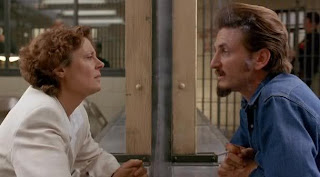
Jeez, where to start; there's so much going on in this movie, but I think the discussion helped to pick out some of the main stuff. I think what got me while watching was the parallels between Matthew and his family and the families of the victims. I think all three families that Helen visited showed pictures of their lost kids- the families of the couple that died and of Matthew. Matt's mother lost him like the parents of the victims lost their kids. Each home was affected in a similar way. I think it was mentioned that there was a sort of cycle of hatred; Matthew's reaction was hatred toward the rest of the world and the parents of the victims were filled with nothing but hatred toward Matthew. For instance, the father of the murdered boy told sister Helen at the end of the movie that he still had hatred toward Matt, even after he was dead.
About the possum flashback of Sister Helen: did she hit the possum first and then stand back and watch the other kids continue to beat it to death? Does she then see herself in Matthew and reasons that the fact that she killed a living thing before (or at least participated) doesn't give her reason to judge, or at least helps her to understand him a bit more as a human rather than just a monster?
Christ has died as atonement for our sins, and when God sees us, he sees Christ- that is, he sees us as sanctified, cleansed and made holy by his grace- and the scene where Matthew is strapped down and looking through the glass to Sister Helen, in my opinion, seems to visually allude to that, whether intentional or not; his arms were eagle spread and when he turns his head to look past his arm to her, very similar to a scene from The Passion.
I think a large part of what makes this story powerful is the horrific and graphic nature of the crime itself; to see that a man who has been a part of a serious, wicked act and then proclaims to trust no one and hate everyone can at his final moment ask for forgiveness and that his death bring relief to those who want to kill him. The worse the crime and the criminal, the more powerful grace and love become because they trump the crime. They don't just cover the petty sins, like stealing candy from a store (though sin is sin), they redeem the capital criminals who are to some, not even worthy to be called animals.
Well, that's it; there's much more to talk about, though, and I really recommend Dead Man Walking if you haven't seen it yet.
No comments:
Post a Comment
Note: Only a member of this blog may post a comment.